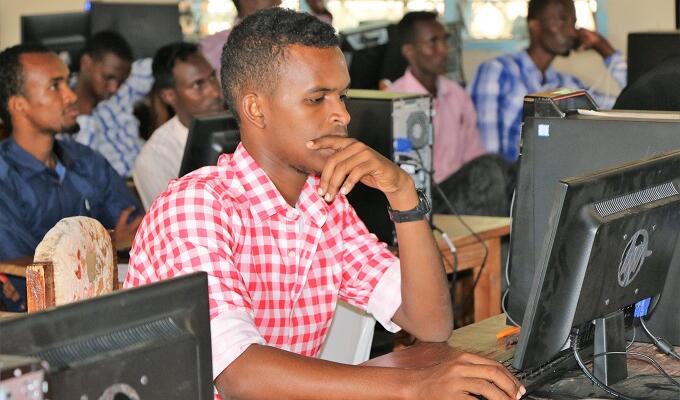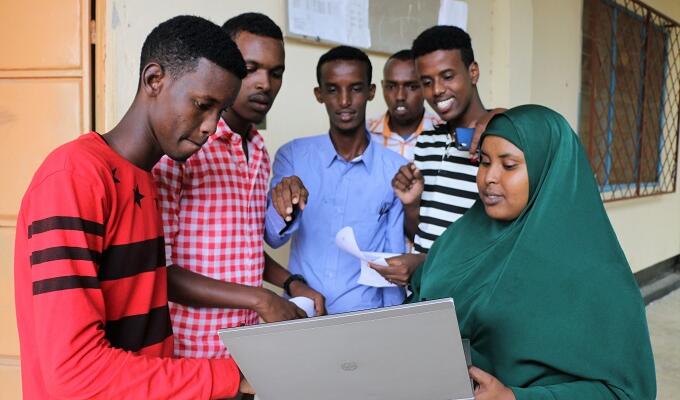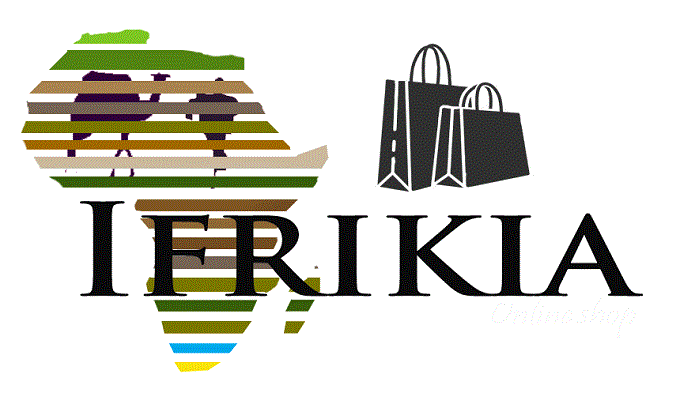


Entrepreneurs on the move
Mohamed Abdullahi arrived in the Dadaab refugee camp in Garissa County, Kenya in late 2010. Having always wanted to return to his hometown of Mogadishu in Somalia, he was able to do so in late 2019 to start pursuing various business interests. He told the International Trade Forum about his experience as an entrepreneur.
Displaced communities are like any other community. The difference is that they fled their homes and now live somewhere temporary. For a community to be successful, it cannot live at the mercy of donations. People should have their own business to improve their lives and the lives of those around them.
For instance, Hagadera camp is one of the best places for shopping in Garissa County. This is because the refugee and host communities can do business. Twenty years ago, when refugees came to Dadaab, it was a desert. Now, it is a small city with hospitals, schools, businesses and an energy system. People are not only able to feed themselves but also to help others. When you give a refugee the opportunity to do business, they make the best of it. They can pay taxes and help contribute to the community.
Most importantly, it is an invaluable learning experience, since refugees are not destined to stay in camps forever. Doing business equips them with the knowledge they need to navigate the challenges ahead.
How did you get started as an entrepreneur?
After I finished my secondary school in the Hagadera refugee camp, I worked as a computer instructor. A few months after that, I happened to see an advert for online freelancing training. I applied, joined and started working online, primarily as a translator.
A study tour to Nairobi at the end of the freelancing programme changed everything for me: I met other entrepreneurs who were telling inspiring stories of how they started with nothing. I thought to myself, if these people can do it, so can I. That trip to Nairobi was a catalyst for every action I have taken since then.
Having the idea for an e-commerce platform in Somalia, Ifrikia, I talked to friends who helped me develop the website and then, as my situation stabilized, I was fortunate enough to return to Mogadishu to work on the business. My partners and I did not have any money or network. We mobilized our families for support, for example for borrowing a camera for product photos or building trust with potential clients.
What challenges are you facing when doing business?
When we first started, one of the biggest challenges was delivering the products to our customers. There is no company offering delivery services here in Mogadishu – and the city is too big for us to cover on foot or by taxi. Imagine a customer places an order for headsets worth $5, but the transport to deliver this costs at least $3. In this case, we were losing more than we earned.
But, the major challenge I have is lack of capital investment. I need to promote the online business, buy the hardware and establish office space to earn the trust of customers and potential suppliers. I cannot accomplish this if there is no tangible capital.
On top of that, according to data from the UN and the Government of Somalia, a majority of the country’s population are youth. With this comes opportunities for our business to thrive, but many youth are unemployed or have a very low income. As a result, they do not shop online because they do not believe in it or think the prices are inflated. In addition, often the mothers who have little internet experience do the family shopping.
How are you solving these challenges?
There is always a solution! We often use our networks and friends. We are currently trying to build trust among the local stores to get them to work with us using the platform.
As for delivery, a friend joined the business and gave us access to a bike, with which we can deliver much cheaper and faster. We have not yet managed to access capital, but fortunately our families support us. We are doing our best to stand out from the crowd, being the one-stop point for all the shopping you need in Mogadishu.
What’s next on your business agenda?
We have been online now for five months and we realized that we were not working enough with retail, so we are trying to pivot to engage these businesses and keep building our e-commerce platform.
We are also looking into building a platform that shows all available hotels and logistical tourism needs, so someone interested in travelling to Somalia can book everything they need in one place. We also want to start encouraging local tourism. In 2010, things were completely different. Today the whole city is open. Ten years from now it will yet again be a different place, probably open for tourists. We want to be ready for that and be a leader in the country’s future tourism business.



